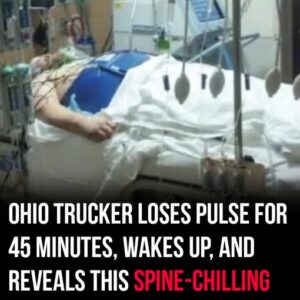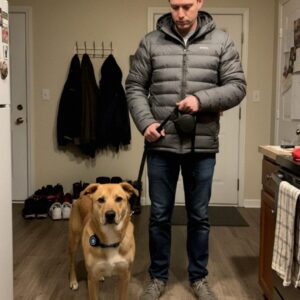The afternoon began like any other Saturday. My mother had volunteered to take Emma, my six-year-old daughter, and Jacob, my four-year-old son, to the Riverside Park while I caught up on work from home. I’d hesitated initially because Emma’s asthma had been acting up lately, a persistent tightness in her chest that the doctor had warned us to monitor closely. But my mother had insisted, claiming she needed “quality time” with her grandchildren.
Before they left, I double-checked that Emma had her rescue inhaler in the front pocket of her little unicorn backpack, and I reminded my mother about it three separate times.
“Jessica, I raised four children,” my mother said with that dismissive wave of her hand she had perfected over a lifetime. “I think I can handle two for a few hours.”
I should have trusted my instincts, that cold knot of dread in my stomach. Instead, I kissed both kids goodbye and watched them drive away in my parents’ car. My father was driving, humming some old country song, while my mother chatted excitedly about feeding ducks and getting ice cream. Emma looked happy, clutching her stuffed rabbit, and Jacob was already asking when they’d arrive.
Three hours later, I heard the car pull into the driveway. The front door burst open and Jacob ran inside, a whirlwind of energy, covered in grass stains and streaks of chocolate ice cream. My father followed, carrying their backpacks. Then my mother walked in, looking annoyed and flustered. Behind her, Emma stumbled through the doorway, her face pale, her lips tinged with a terrifying shade of blue. She was making a horrible, high-pitched whistling sound with each breath.
My heart stopped. I’d heard that sound before, during her worst asthma attack last year, the one that had landed her in the hospital for two days. I dropped to my knees beside her, pulling her into my arms.
“Emma, baby, where’s your inhaler?”
She couldn’t answer. Her small chest was heaving, her ribs visibly straining beneath her thin t-shirt. Tears streamed down her cheeks as she clutched at her throat, trying desperately to pull in air. The raw panic in her eyes made my blood run cold.
“Mom, where’s her inhaler?” I demanded, my voice sharp as I looked up at my mother.
My mother crossed her arms, her expression a bizarre mixture of defiance and irritation. “I got rid of it.”
The words didn’t register immediately, they were so nonsensical. “What do you mean, you got rid of it?”
“She kept reaching for it every five minutes, making a spectacle of herself. We were having a nice time by the river, and she starts wheezing and digging through her bag. I told her to stop using that thing and breathe some fresh air. When she wouldn’t listen, I took it and threw it in the water.”
The room tilted. My vision narrowed to a single, horrifying point. “You threw her medication… into the river?”
“It’s ridiculous how dependent she is on that thing,” my mother continued, as if explaining why she’d confiscated a toy. “Your brother and sisters never needed all this coddling. Fresh air and exercise, that’s what children need, not chemicals pumped into their lungs.”
Emma’s breathing grew more labored, the whistling sound turning into a desperate rasp. Her fingernails were turning blue. I grabbed my phone from the coffee table, fumbling to unlock it, but my hands were shaking so badly I dropped it.
“What is wrong with you?” I screamed at my mother, scrambling to pick up my phone. “She has asthma! That inhaler keeps her alive!”
My mother’s face hardened, her features setting into a mask of stubborn pride. “It’s embarrassing for me, Jessica. Do you know how it looks when my granddaughter is pulling out medical equipment every few minutes? My kids need to know how to breathe air properly, not rely on crutches for every little thing.”
I stared at her, unable to comprehend the monstrous selfishness of what I was hearing. Emma collapsed against me, her body going limp. I shook her gently, but her eyes were rolling back into her head.
“Look at the state of my daughter!” I shouted, holding Emma’s lifeless form up for them to see.
My father, who’d been silent until now, just shrugged from the doorway. “It’s fine, Jess. She’ll just wake up. She’s probably being dramatic.”
“Plus, we need to teach her to stop getting all the attention,” my mother added, her voice sharp with resentment. “Jacob barely got to do anything today because everything revolved around Emma’s breathing problems.”
“Some children just make too much drama,” my father concluded, settling into his favorite recliner as if this was a normal Tuesday evening. “She’ll be fine in a few minutes. Kids are resilient.”
I didn’t waste another second. I scooped Emma into my arms, her small body frighteningly light, and ran for my car. Jacob started crying, calling after me, but I couldn’t stop. Every second mattered. I laid Emma across the back seat, her chest barely moving, and drove toward the hospital with my hazard lights flashing, honking at every intersection, a prayer and a curse caught in my throat.
The emergency room doctors took her immediately. They whisked her away on a gurney while I gave them her medical history, my voice breaking with each word. A nurse guided me to a small, sterile waiting room with harsh fluorescent lights and uncomfortable plastic chairs. I sat there for forty-seven minutes, each one feeling like an eternity, my mind a slideshow of worst-case scenarios.
Finally, Dr. Morrison came out, his expression grave. He sat down beside me, and I knew before he spoke that something was terribly wrong.
“Mrs. Patterson, Emma is stable now. We’ve administered treatments, and she’s breathing with assistance.” He paused, and the weight of that pause crushed the air from my lungs. “However, she experienced a severe hypoxic episode—a dangerous period where her brain wasn’t getting adequate oxygen. We’ve run initial scans, and I’m concerned about what we’re seeing.”
He chose his words carefully, a kindness for which I was not grateful. “We need to keep her for observation and run more comprehensive tests, but there are already some troubling signs of neurological impact.”
The words hit me like a physical blow. “What kind of signs?”
“Reduced responsiveness on her left side, delayed reactions to stimuli,” he explained, his voice gentle but clinical. “Mrs. Patterson, I want to be clear, we won’t know the full extent of the damage for several days, possibly weeks. But based on what I’m seeing right now, I’m very concerned about permanent neurological damage. The brain is incredibly sensitive to oxygen deprivation, and Emma went far too long without adequate oxygen levels.”
Over the next week, my worst fears were confirmed. The MRI showed damage to multiple regions of her brain. The neurologist explained that Emma had suffered a moderate to severe hypoxic brain injury. She would need extensive therapy, possibly for the rest of her life. There was significant impairment to motor function on her left side, cognitive processing delays, and speech difficulties that might never fully resolve.
“Is she going to die?” I whispered, the words tasting like ash.
“We’re doing everything we can to ensure she doesn’t. But Jessica, this is serious. If she’d gone even five more minutes without treatment, we would be having a very different conversation. As it is, she’s lucky to be alive, but the quality of that life has been significantly impacted.”
I sat there long after Dr. Morrison left, staring at the generic landscape painting on the wall, my mind struggling to process the cataclysm. Eventually, a nurse told me I could see Emma. She was in the pediatric ICU, connected to machines that beeped and hissed, an oxygen mask covering most of her small, pale face. Her eyes were half-open, but they didn’t focus on me when I entered. I held her hand, and when I squeezed it gently, there was barely any response. I stayed there through the night, watching her breathe, terrified that if I looked away, she might stop.
Emma remained hospitalized for eleven days. During that time, the full scope of her injuries became heartbreakingly clear. My beautiful, bright little girl who loved reading and drawing and making up elaborate stories about her stuffed animals had been robbed of her future because my mother thought asthma medicine was an embarrassment.
My mother called seventeen times that first evening. I didn’t answer. My father sent text messages asking when I’d be home, saying Jacob was asking for me, mentioning that they had plans the next day and needed me to come get my son. I turned my phone off.
The rage came slowly, building like a storm on the horizon. By the time I left the hospital on day three to check on Jacob and gather some supplies, I was no longer the same person. Something fundamental had broken inside me, replaced by something cold, sharp, and calculating.
I went home, spent time with Jacob at the neighbor’s house where he’d been staying, and then I sat at my kitchen table with my laptop and began my research. My parents lived in a small, mortgage-free house my father had inherited. My mother didn’t work. My father was a retired postal worker with a modest pension. They weren’t wealthy, but they were comfortable. That comfort was about to end.
I started with Adult Protective Services. I crafted a detailed, anonymous report about a vulnerable elderly man, inflating my father’s age by eight years, living with a controlling, potentially abusive spouse who prevented him from accessing medical care and isolated him from family. I included specific details about their address and even mentioned my father’s high blood pressure medication that I knew he sometimes skipped.
Then I called the IRS tip line. Years ago, my mother had sold handmade crafts at local fairs, earning cash that I was absolutely certain she’d never reported. I provided dates, locations, and estimated earnings. I also mentioned that my father had done some under-the-table handyman work.
Next came the homeowners’ association. My parents’ neighborhood had strict rules about property maintenance, rules they’d been skirting for years. I filed multiple anonymous complaints about their overgrown yard, the peeling paint, the broken fence, and the rusted-out truck in their driveway, attaching photographs I’d taken months ago.
I contacted the church where my mother volunteered. Using a fake email address, I posed as a concerned parishioner who had witnessed my mother being verbally aggressive towards some of the elderly people she was supposed to be helping. I described incidents that could have happened, the kind of behavior I’d seen her display when she thought no one important was watching.
Finally, I filed a police report, detailing exactly what had happened to Emma, including medical records and Dr. Morrison’s preliminary assessment. I pressed charges for child endangerment and reckless endangerment.
Within forty-eight hours, my mother was arrested. I watched from my car as police officers put her in handcuffs and loaded her into a squad car. My father stood in the doorway, looking confused and afraid. Good.
I also obtained an emergency restraining order against both of them, citing the danger they posed to my children. The judge granted it immediately. I hired a lawyer, draining my savings account, and filed a civil lawsuit seeking damages for Emma’s medical care, future therapy costs, and pain and suffering.
Then I made phone calls to family members. I called my three siblings, my aunts and uncles, and even my mother’s closest friends. I told them exactly what had happened, holding nothing back. I described Emma’s blue lips, her collapsing body, my mother’s callous dismissal, and my father’s claim that she was being “dramatic.” I sent them copies of the medical reports and photos of Emma in the ICU.
The response was immediate and brutal. My sister Rebecca, who had two kids of her own, stopped speaking to our parents entirely. My brother Michael drove to their house and, according to neighbors, had a screaming match with our father on the front lawn. My aunt Dorothy, my mother’s own sister, left a voicemail for my mother that was so scathing, I actually felt a moment of satisfaction when I heard about it.
Within a week, my parents were social pariahs. Their church asked my mother to step down from her volunteer position. The HOA began fining them daily. Adult Protective Services showed up at their door. An IRS agent contacted them about their unreported income. Their world was beginning to crumble, piece by piece. And I was just getting started.
Between the arrest and the trial, eight agonizing months passed. Eight months where I watched my parents scramble to maintain any semblance of their former lives while I methodically ensured that every foundation they stood on crumbled beneath them. During those months, Emma had fourteen major medical appointments, countless therapy sessions, and three hospitalizations when her compromised respiratory system caught infections that a healthy child would have shrugged off. I documented every single one.
The costs mounted into six figures, and my insurance company started making noises about investigating my parents for recovery of expenses. I encouraged them, providing contact information and a detailed timeline. The insurance company hired their own investigators, adding another layer of harassment to my parents’ daily existence.
I also discovered that my mother had been running her mouth at church before they’d asked her to step down. She told several of her friends that I was overreacting, that Emma had always been a sickly child, that perhaps if I’d been a better mother, she wouldn’t be so dependent on medication. One of those friends, bless her conscience, recorded one of these conversations and sent it to me. I provided that recording to my lawyer, to the prosecutor, and to every family member who’d expressed even the slightest sympathy for my mother’s position. Hearing her actual words, the contempt in her voice when she talked about her own granddaughter, changed several minds.
The trial date was set for late November. As it approached, I received a handwritten letter from my father. In shaky script, he begged me to drop the charges. He claimed my mother hadn’t meant for any of this to happen, that they were losing everything. He wrote that the stress was killing him and that I’d already punished them enough.
I read that letter three times. Then I drove to Emma’s neurologist appointment, where I watched my daughter struggle through cognitive tests that a typical six-year-old should breeze through. I watched her frustration mount as she couldn’t make her left hand work properly to stack blocks. I watched her cry when she couldn’t remember a simple three-word sequence.
That evening, I wrote a response. I detailed every therapy session, every tearful breakdown, every time Emma had to ask me why she couldn’t “think right” anymore. I described the conversations I’d had with her teachers about her new limitations, the special education evaluations, the IEP meetings. I told him about the night Jacob had nightmares so severe he vomited, terrified that his grandmother would come back and hurt Emma again. I explained that Emma would likely never live independently and would struggle with employment as an adult. I calculated the lifetime cost of her care. I ended the letter with a simple question: Did you think saying sorry would fix this?
He never wrote back.
The prosecution’s case was airtight. They had medical experts, my testimony, and even testimony from a park ranger who had been near the river that day. She’d witnessed my mother throw something into the water while a small child cried, but hadn’t realized at the time what it was. She’d noted it in her daily log as “strange behavior.” Now, that log entry became evidence.
During the trial, the prosecutor played the recording of my mother dismissing Emma’s condition to her church friends. The courtroom fell silent as her voice rang out, complaining about how Emma’s medical needs embarrassed her. Several jurors looked physically ill. One woman had tears streaming down her face. That recording destroyed any sympathy the jury might have felt.
I testified for three hours. The defense attorney tried to rattle me, suggesting I was an overbearing mother who’d raised Emma to be dependent on medication she didn’t truly need. I calmly pulled out Emma’s complete medical file, including records from three separate pulmonologists, documentation of two previous hospitalizations, and a letter from her pediatrician stating explicitly that without her rescue inhaler, Emma was at risk of death during an attack.
The defense switched tactics, implying I was motivated by money and revenge. I looked directly at the jury and said, “I’m motivated by the fact that my daughter will never be the same again because my mother decided her pride was more important than my child’s life.”
The prosecution rested with Dr. Morrison’s testimony. He brought scans of Emma’s brain, showing the areas damaged by oxygen deprivation. He showed before-and-after videos: Emma at age five, bright and energetic, contrasted with Emma at seven, struggling through a simple conversation with noticeable delays and slurred speech. Several jury members were crying openly by the time he finished.
My mother chose to testify in her own defense. She maintained that she’d been trying to help Emma become stronger, that children needed to build up their lungs naturally. She actually said under oath that she believed Emma would have been fine if I hadn’t panicked and rushed her to the hospital.
The prosecutor’s final question was simple. “If you could go back to that day, knowing what you know now, would you still throw that inhaler in the river?”
My mother paused too long before answering. “I would handle it differently,” she finally said, which wasn’t an answer at all.
The jury deliberated for less than three hours. Guilty on all counts.
The judge, an older woman with silver hair and steel in her eyes, addressed my mother directly during sentencing. “You had multiple opportunities to prevent this tragedy. You chose your pride and your outdated beliefs over a child’s life. You showed no remorse, even as that child suffered permanent, life-altering injuries. This court finds your actions unconscionable.”
My mother received twenty-two months in county jail, three years of probation, and was ordered to pay restitution. She was also permanently banned from unsupervised contact with any minor children.
The civil suit resulted in a judgment of $2.3 million. My parents didn’t have anywhere near that amount. Their house was seized and sold at auction. Their pensions were garnished. They declared bankruptcy, but it didn’t discharge the judgment related to Emma’s care. They would be paying for the rest of their lives.
But the financial ruin was only part of their punishment. The social destruction was equally comprehensive. My mother was voted out of her garden club. The library where she’d read to children for eight years informed her that her services were no longer needed. My father was dropped from his Rotary Club. Their best friends stopped returning their calls. Their mailbox became a receptacle for hate mail. Someone spray-painted “Child Abuser” on their garage door.
They moved three times in two years, each time hoping to escape their notoriety, each time being discovered. The internet made anonymity impossible. They finally settled in a small town four hours away, in a trailer park where people either didn’t have internet or didn’t care enough to look them up.
Emma’s progress has been slow and heartbreaking. She can walk again, but with a limp. Her speech improved but remains slightly slurred. Her cognitive abilities recovered partially, enough that she could eventually return to school, but she’ll never catch up. She gets frustrated easily now, crying when she can’t do things that came naturally before. She asks me sometimes why her brain feels “broken,” and I don’t have an answer that makes sense to a child.
My siblings split on how to handle the situation. Rebecca and I grew closer, bonded by our shared horror. Michael tried to maintain some relationship with them but eventually gave up when our mother refused to admit she’d done anything wrong. My youngest sister, Sarah, initially sided with our parents, claiming I was overreacting. That changed when she visited Emma and saw firsthand what “overreacting” actually looked like. She came on a Saturday morning when Emma was having a bad day, a day where her brain just wouldn’t cooperate. Emma was trying to eat cereal, her left hand trembling as she lifted the spoon, milk dribbling down her chin. She got frustrated and knocked the bowl over, then started crying, these heartbreaking sobs of pure frustration, saying, “I can’t, I can’t, I can’t,” over and over.
Sarah just stood there, frozen. Later, after Emma had calmed down, she was pale, her hands shaking. “She can’t read anymore, can she?” she asked quietly.
“Not really. She can recognize some basic words, but anything complex gets jumbled.”
“But she loved reading.”
“I know.”
“I didn’t understand,” she finally said. “I thought you were exaggerating. I thought maybe she’d had a bad asthma attack, and you were using it as an excuse to punish them.”
“This is her good day,” I told her. “On bad days, she has seizures sometimes. Last week, she forgot who Jacob was for twenty minutes.”
Sarah started crying then, really crying. The rift in our family became permanent.
I read those reports from the private investigator about my parents’ new life—living in poverty, their health declining—without a shred of sympathy. They were living with the consequences of their choices, just as Emma was living with the consequences of theirs. The difference was, Emma had no choice. They did.





